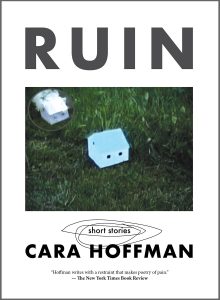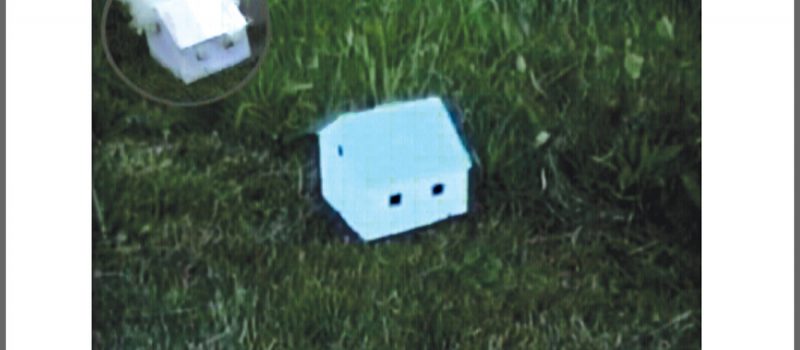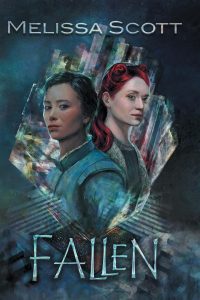Caren Gussoff Sumption Reviews Ruin by Cara Hoffman
 Ruin, Cara Hoffman (PM Press 978-1-62963-931-4, $25.95, 136pp, hc) April 2022.
Ruin, Cara Hoffman (PM Press 978-1-62963-931-4, $25.95, 136pp, hc) April 2022.
I was halfway through the ten stories in Cara Hoffman’s latest collection, Ruin, before I was able to start to understand how to read them – and then, nearly done with all of them when it became clear why the collection fit in Locus at all. Highly literary, strikingly stylized, and mondo experimental, Ruin is a collection that sneaks up, climbs on your back, and taps your shoulder until you either pay close attention…or shake it off. It’s not a book for everyone, and I doubt Hoffman intended it to be. But if you like puzzles, you’re patient with genre-bending slipstream, and dig a good apocalypse, then you’ll find Ruin worth the wrestle.
The world is at the beginning of the end (you know, in “ruin.” Get it?). It’s unclear what set off the slow descent towards doomsday, but stories hint at disease, at cataclysmic climate disasters, and at least one story, “Strike Anywhere,” sets us just behind the front line of a long-waged war. What’s left are just scraps of life: songs and commercial jingles long-gone but well-remembered; motions and gestures that used to bring pleasure (sex and conversation, for example, leading to meaningful connection), now just repeated from habit, or to desperately find comfort; memories of childhood, goals, and aspirations, now lost; and the realization that everything once thought important, such as facts, history, and belonging, are, at best, transient, and, at worst, disposable.
The characters in Ruin have, for the most part, already abandoned all hope. Not all of them have forsaken it as thoroughly as the 11-year-old narrator of “Childhood,” who has – precociously and creepily – traded in her youth to live as an alcoholic elderly man, complete with cynicism, regrets, and tweed cap. At first, the situation is so absurd that it seems funny; it must be just childish pretending, though the game is bizarre. But, if it is imagination, it is imagination brought forth to existence, as the girl/old man watches, with exhausted resignation and snarky accounting, her parents’ (who she dubs “her daughter” and “son-in-law”) marriage collapse, leaving her alone with nothing but a glass of Grand Marnier and her anachronistic 1940s references for company.
No, few of the other characters have as completely cast off all vestiges of hope: in “Strike Anywhere,” the story of constant war, another young narrator bides his time until his father, a paratrooper, returns to camp by preparing a homecoming surprise. He has emptied discarded shells, collecting and saving the gunpowder, and then wheeled/dealed to get ahold of the titular matches – all so that he can greet his father by literally writing his name in lights. It’s a sweet moment in a devastated landscape, and the gift is accepted with love, as we’re treated to a second of kindness, seeing a father hold his son close.
There are other moments of small happinesses, though they’re far from this kind of wholesome. Prisoners in a work camp tend beehives in “The Apiarist,” collecting honey for an oppressive regime, but one prisoner finds pleasure in what remains of her sexuality. She flashes helicopters, and then swims with another prisoner she finds attractive, gratified to find, in the end, that he has paid her tribute by writing her name: not in gunpowder, but in congealed algae at the pool. The collection’s namesake, “Ruin,” follows an artist who picks up a stranger at a thrift store on the Lower East Side of New York City. They have sex, and then she photographs him. His physical beauty and his work, a weirdly underground study of poisonous frog venom and its effect on the neurobiology of religious thought, inspire and distract her from her desolate, destroyed surroundings. And a mouse (yes, a mouse), in “They” dies slowly and painfully, but not before we relive recent events, illustrating the dignity in what appears otherwise inconsequential.
The prose here is thick, heavy with metaphor, innuendo, and references to pop culture already out-of-date. It’s suggestive rather than explanatory, and frequently requires more than one read to follow completely. It’s no surprise when speculative fiction demands more than a mere suspension of disbelief, instead imposing a complete leap of faith. Ruin, however, necessitates a free-fall, with bittersweet images as its only handholds. If you’re a stickler for plot or action, you’ll get very little beyond a sense of plot or gesture towards action. But few books evoke how desperation and resignation feel – really feel, in the gut – and this is something Hoffman has done exceptionally well. It’s a hard collection to get through, but has its rewards for the dedicated.
It’s also incredibly, undeniably depressing. As stated, there are glimmers here and there of things still lovely and meaningful, but they are not the point of the stories. They’re gulps of water to keep readers going on the dusty path of destruction. I remain unsure whether Ruin should be read as cautionary or as portraits, capturing the faces and facets of human suffering.
It’s entirely possible that the collection can stand as both.
Caren Gussoff Sumption is a writer, editor, Tarot reader, and reseller living outside Seattle, WA with her husband, the artist and data scientist, Chris Sumption, and their ridiculously spoiled cat-children.
Born in New York, she attended the University of Colorado, the School of the Art Institute of Chicago, Clarion West (as the Carl Brandon Society’s Octavia Butler scholar) and the Launchpad Astronomy Workshop. Caren is also a Hedgebrook alum (2010, 2016). She started writing fiction and teaching professionally in 2000, with the publication of her first novel, Homecoming.
Caren is a big, fat feminist killjoy of Jewish and Romany heritages. She loves serial commas, quadruple espressos, knitting, the new golden age of television, and over-analyzing things. Her turn offs include ear infections, black mold, and raisins in oatmeal cookies.
This review and more like it in the January 2023 issue of Locus.
 While you are here, please take a moment to support Locus with a one-time or recurring donation. We rely on reader donations to keep the magazine and site going, and would like to keep the site paywall free, but WE NEED YOUR FINANCIAL SUPPORT to continue quality coverage of the science fiction and fantasy field.
While you are here, please take a moment to support Locus with a one-time or recurring donation. We rely on reader donations to keep the magazine and site going, and would like to keep the site paywall free, but WE NEED YOUR FINANCIAL SUPPORT to continue quality coverage of the science fiction and fantasy field.
©Locus Magazine. Copyrighted material may not be republished without permission of LSFF.








